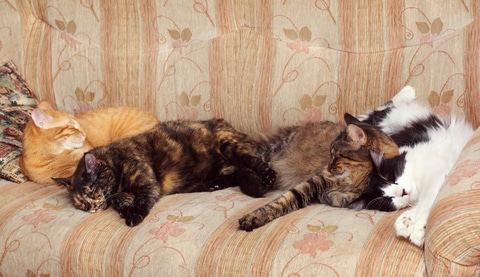Behavior, Everything, Cats
Cats and Socialization
Some cats are playful and affectionate with people. Others bite and scratch. Many cats do both.
Aggression is natural with cats. After all, they are predators by nature. Play is an expression of their predatory behavior. Biting and clawing are also instinctive reactions to protect themselves when cats are afraid or upset.
For more timid cats, their reaction to stressful situations is to retreat.
As humans, we learned how to interact with other people and with animals from our parents, our siblings, our classmates, and our teachers, among other people. Cats also learn socialization skills from their mothers and littermates as well as from their contact with humans. If kittens are separated from their mother and litter too early, or if they grow up with limited or no human contact, socialization is more difficult — but still possible.
Socialization during kittenhood
The more people and situations that cats are exposed to as kittens, the more comfortable they’ll be with a variety of people and situations. Their personalities and preferences are shaped largely by their experiences when they’re young.Have your kitten spend time with different people, both adults and children.
When meeting new people is a normal occurrence, it’s less likely to be a stressful experience. Encourage visitors to pet your kitten and to play with her. Younger children should be supervised when handling pets to keep the experience a positive one for both the child and the kitten.
Introduce your kitten to other animals.
If your household already has other pets, your kitten will adjust to being with them. With or without other household pets, your kitten will still benefit from exposure to other cats and to dogs that aren’t aggressive toward cats. If a friend or neighbor has a puppy, both animals could benefit from time spent together during their more formative months. As with young children and pets, time that animals spend together should be supervised until it’s clear that the animals get along.
Teach your kitten good play habits.
Use toys for the objects to be attacked, not your hands. When she uses her claws or teeth in play, withdraw from playing immediately. She’ll learn fast that teeth and claws don’t belong in playtime involving human contact.
Avoid playing too roughly and overstimulating your kitten. To satisfy your cat’s prey instinct, also play with her using toys. She may be happy with toys that she can bat around with her paws and bite into. For more fun, let her chase toys by dragging them around on a string. Or make the string or an old belt a toy in itself.
Handle and groom your kitten.
Kittens that are accustomed to being handled and groomed are less likely to react badly if a stranger picks them up or if matted hair needs to be removed. Hold and pet your kitten every day.
Take your kitten to a veterinarian.
Routine veterinary visits allow kittens to become accustomed to the sights and sounds in a veterinary clinic, the way the veterinarian handles them, and the ride there and back.
When socialization with humans is’t easy
Socialization can be difficult when cats haven’t been taught proper cat behavior or when they haven’t grown up with positive interaction with humans. With time, patience, and care, however, they can still learn and adjust.
Recognize your cat’s limits.
A few minutes of petting may be all that your cat wants. When her body language tells you that she’s had enough (i.e flickering tail, flattened ears, perhaps a growl) stop. Watch her when visitors are petting her so that you can point out signals that they may not recognize. If she’s frightened by people she doesn’t know, let her stay away when visitors are present. When she’s ready, she’ll come to them on her terms.
Reinforce positive behavior.
Praise your cat or kitten during playtime when she doesn’t use her teeth or claws. If she exposes her teeth or claws during contact with you, stop playing. Ask other people to do the same. If she is shy, give visitors treats to give to her as a reward when she approaches them.
Related articles
- Grooming Your Cat
- Understand and Communicate with Your Cat
- Games Animals Play
- Can Cats and Dogs Live Together?
- What Children Learn with and from Pets
- Cats and Babies
- Cats and Stress


